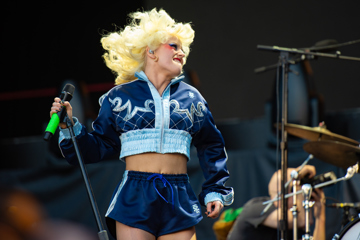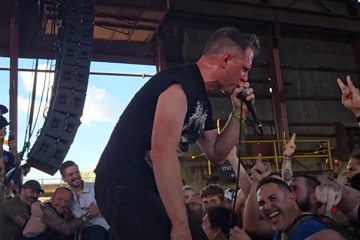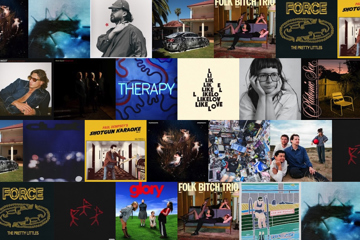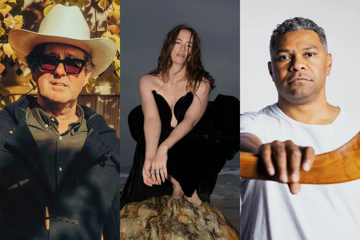The Upstagers
"There are theatre people, your every day city urban people and your remote communities with a large numbers of Aboriginal people. There is a huge cross-section of people we perform to."
"I profoundly reject the black armband view of Australian history,” said then Prime Minister John Howard in an address to Parliament in 1996. “I think we have been too apologetic about our history in the past.” Understandably, the comments were met with fury, but from pain arose hope and emerged The Black Arm Band, an ensemble of Australia's premier Indigenous artists. Since debuting in 2006 at the Melbourne International Arts Festival, the collective's rotating lineup has included, among many, Dan Sultan, Archie Roach, Jimmy Little, Gurrumul Yunupingu, Shane Howard and artistic director Lou Bennett.
A Yorta Yorta woman from Echuca who began her musical career in ARIA Award-winning trio Tiddas, Bennett says the name is inclusive to all Australians and is as much about pride as it is making a political statement. “We're from a culture and history that is the oldest living culture in the world and that's something we should be proud of, not embarrassed or intimated by.”
The group's current production, Dirtsong, is set against a backdrop of moving imagery and text and features songs performed in 11 different Aboriginal languages. The songs themselves are conversational pieces and a journey through Australia's cultural heartland, inspired by the writing of acclaimed author Alexis Wright. “Musically, they tell of the importance of community, language and country and the connection between the three elements,“ says Bennett.
Like their stories, The Black Arm Band's music is real. Many of the artists have grown up around pain, suffering and uncertainty, many from the Stolen Generation. At the core of their music is the protest song. Paul Kelly and Kev Carmody's From Little Things Big Things Grow, Archie Roach's Took The Children Away and Bennett's own Our Home, Our Land have all featured prominently in their productions. With a powerful message at heart, Bennett believes it's important to deliver music in an optimistic and celebratory way. “It's not being of the downer or pointing the finger. It's not about that. It's the celebration that we're still here and that we will continue to grow and evolve and that our culture is still alive and still very prominent within our lives.”
Don't miss a beat with our FREE daily newsletter
Drawing inspiration from a variety of genres, Bennett lists Bob Marley as a prime influence. “With Country and Western, rock, hip hop and reggae, they're relevant to Aboriginal people not just because they tell stories, but because of the idea of protest. Bob Marley is one of my absolute idols, not just for the musicality of his work but what he's singing about. He's singing about being an oppressed person and also celebrating his culture and his uniqueness and striving to fight for his survival.”
Celebrating culture, their upcoming events at the Melbourne Recital Centre will see Gail Mabo introduce the performances. The daughter of Land Rights activist the late Eddie Mabo, the shows will honour the 20th anniversary of the High Court's historic decision. Bennett says the songs will be even more emotional to perform than usual, “paying honour, tribute and acknowledgement to a mighty man but also a mighty family. The Mabo family symbolise for me the possibility of what Aboriginal Australia can achieve with determination, discipline and commitment. For me they are royalty, because of their amazing strength. That family went through hell and back to make a stand and get an extremely important point across; that is that we are still connected to this country.”
Though their music is uniquely Australian and indeed connected to country, it is meant for the world stage. The group recently returned from London, having been invited by the British Council to play at the Cultural Olympiad, a music festival situated by the Thames River, leading up to the Olympic Games. Teaming up with Welsh musicians 9Bach to combine unique music from opposite ends of the globe, the collaboration became an international success story. “We had a wonderful time producing music together,” recalls Bennettt, who is currently completing her PhD in retrieving, reclaiming and regenerating language and culture through the arts. “The main theme of the music was looking at our mother tongues, both from the north and south hemispheres, and how important it is for us to continue to speak our languages. Also looking at the similarities of colonised groups and how we continue to practice our ceremony, ritual and culture on a daily basis and to share that for the whole world to see.”
Along with 9Bach, the group have shared the stage with various special guests, from Sinead O'Connor, Mavis Staples and Joss Stone to up-and-coming Indigenous artists Bevan Gapanbulu, grandson of Yothu Yindi's lead singer Mandawuy Yunupingu, Ursula Yonich, star of The Sapphires stage show, and North Queensland soul singer Deline Briscoe. Since forming, over 50 different artists have performed with the ensemble. The alignment speaks of the group's depth and is reflected by the diversity of their audiences. “There are theatre people, your every day city urban people and your remote communities with a large numbers of Aboriginal people. There is a huge cross-section of people we perform to.”
The stages too are as diverse as the music they play. “We perform on very large-scale stages, stages that a lot of Aboriginal people haven't had access to, like the Sydney Opera House, the State Theatre, Hamer Hall and even the Queen Elizabeth Hall in Southbank, London.” The group will extend their horizons early next year when they make their US debut in New York City.
The Black Arm Band have also joined forces with the Fred Hollows Foundation to deliver community workshops and performances in regional and remote communities, “where we can take our shows and put on a similar performance on a basketball court or a football oval,” something Bennett is justifiably extremely proud of. The pairing has engaged people from isolated areas with music, and in the process put healthcare on the agenda. Bennett recalls one concert on Thursday Island as a career highlight. “After rehearsal I remember going back to the motel and we were just about to sit down and have dinner and all of a sudden all these people walked past with eye patches on. It looked like they'd just been to the doctors. It didn't hit me until later on that the Fred Hollows Foundation had followed us there with their eye surgery van and had done work for the community whilst Black Arm Band were getting ready to perform. The next day a lot of the people had their eye patches taken off and had big smiles on their faces. Some of these people hadn't seen for years and here they were now able to watch us on stage.”
With a mission statement to showcase, celebrate and share the contribution of Aboriginal music to contemporary Australia, you'd be hard pressed to find a more inspired and inspiring group of artists than The Black Arm Band.
The Black Arm Band will be playing the following shows:
Saturday 1 September - Melbourne Recital Centre VIC







